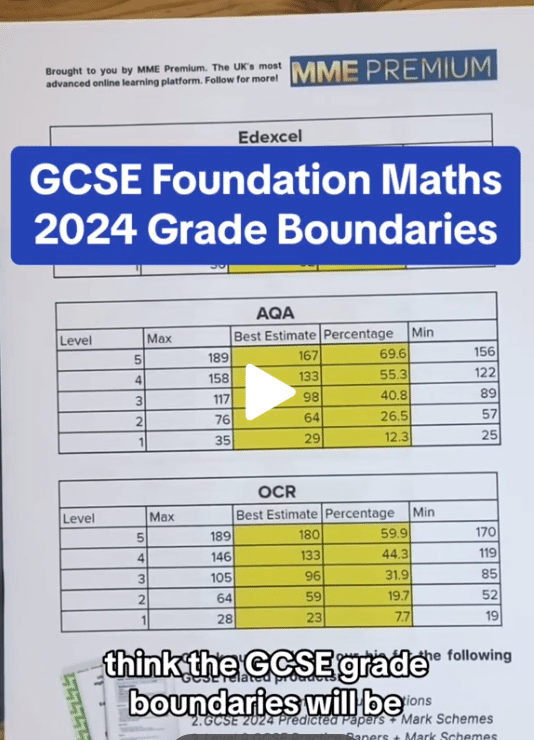Functions
Functions Revision
Functions
In maths, a function is something that takes an input and produces an output. Functions may be given in the form of function machines – or they may be given as mathematical expressions.
Make sure you are happy with the following topics before continuing.
Type 1: Evaluating Functions
Evaluating functions involves putting numbers into the function to get the result.
Example: A function is given by f(x) = 3x+1, Find f(10)
All this requires is to replace x with 10 and calculate the result.
When we input 10 into this function that would look like:
f(\textcolor{red}{10}) = 3\times \textcolor{red}{10} + 1 = 31
Type 2: Composite Functions
A composite function is the result of one function being applied immediately after the other.
Example: Let f(x)=\textcolor{red}{2x-3} and g(x)=\textcolor{blue}{x+1}, find fg(x)
To find fg(x) we replace x in f(x) with g(x)
fg(x) = f(g(x)) = \textcolor{red}{2(}\textcolor{blue}{x+1}\textcolor{red}{) - 3}
Next we can expand the brackets and simplify if required.
\textcolor{red}{2(}\textcolor{blue}{x+1}\textcolor{red}{) - 3} = 2x+2-3 = 2x-1
Type 3: Inverse Functions
An inverse function is a function acting in reverse. The inverse function of f(x) is given by f^{-1}(x), and it tells us how to go from an output of f(x) back to its input.
Example: Given that f(x) = \dfrac{x+8}{3}, find f^{-1}(x)
Step 1: Write the equation in the form x = f(y)
For this we need to replace all the x‘s in the equation with y‘s and set the equation equal to x
f(x) = \dfrac{x+8}{3} becomes x= \dfrac{y+8}{3}
Step 2: Rearrange the equation to make y the subject.
\begin{aligned}x&= \dfrac{y+8}{3} \\ 3x& = y+8 \\ 3x-8 &= y \end{aligned}
Step 3: Replace y with f^{-1}(x)
\begin{aligned}y & = 3x-8 \\ f^{-1}(x) & = 3x-8\end{aligned}
Note:
Sometimes functions are displayed in the following form:
f:x \rightarrow 3x-5
This is the same as f(x)=3x-5
Example 1: Composite Functions
Let f(x)=x-3 and g(x)=x^2
[4 marks]
Find:
a) fg(10) – we must find g(10) then apply f(x) to the answer.
g(10) = 10^2 = 100 so fg(10) = f(100) = 100 - 3 = 97.
b) gf(-4) – we must find f(-4) then apply g(x) to the answer.
f(-4) = -4-3 = -7 so gf(-4) = g(-7) = (-7)^2 = 49
c) an expression for fg(x) – we need to input g(x) into f(x). So, we get
fg(x) = f\left(g(x)\right) = g(x) - 3 = x^2 - 3
Example 2: Inverse Functions
Given that f(x) = 3x - 9, find f^{-1}(x)
[3 marks]
Step 1: Write the equation in the form x = f(y)
f(x) = 3x- 9 becomes x = 3y-9
Step 2: Rearrange to make y the subject
\begin{aligned}x &= 3y-9 \\ x+9 &= 3y \\ \dfrac{x+9}{3} &=y\end{aligned}
Step 3: Replace ywith f^{-1}(x)
\begin{aligned} \dfrac{x+9}{3} & = y \\ f^{-1}(x) & = \dfrac{x+9}{3}\end{aligned}
Functions Example Questions
Question 1: Let f(x) = \dfrac{10}{3x-5}
a) Find f(10)
b) Find f(2)
c) Find f(-1)
[4 marks]
a) Substituting x=10 into f(x), we find,
f(10) = \dfrac{10}{3(10)-5} = \dfrac{10}{25}= \dfrac{2}{5}=0.4
b) Substituting x=2 into f(x), we find,
f(10) = \dfrac{10}{3(2)-5} = \dfrac{10}{1}= 10
c) Substituting x=-1 into f(x), we find,
f(10) = \dfrac{10}{3(-1)-5} = \dfrac{10}{-8}=-\dfrac{5}{4} =1.25
Question 2: Let f(x) = \dfrac{15}{x} and g(x) = 2x - 5
a) Find fg(4)
b) Find gf(-30)
c) Find gf(x)
[4 marks]
a) Substituting x=4 into g(x), then substituting the result into f(x),
g(4) = (2\times 4) - 5 = 8 - 5 = 3
fg(4) = f(3) = \dfrac{15}{3} = 5
b) For gf(-30) we must first find f(-30) and then substitute the result into g(x),
f(-30) = \dfrac{15}{-30} = -\dfrac{1}{2}
gf(-30) = g(-\dfrac{1}{2}) = 2(-\dfrac{1}{2}) - 5 = -1 - 5 = -6
c) To find an expression for gf(x), substitute f(x) in for every instance of x in g(x),
gf(x) = 2(f(x)) - 5 = 2\times(\dfrac{15}{x}) - 5 = \dfrac{30}{x} - 5
Question 3: Find the inverse function of f(x) = \dfrac{5}{x-4}
[3 marks]
So, we need to write the function as y=\frac{5}{x-4} and rearrange this equation to make x the subject. Then, we will swap every y with an x – and vice versa.
We won’t be able to get x on its own whilst it’s in the denominator, so our first step will be multiplying both sides by (x-4):
y(x-4)=5
Then, divide both sides by y:
x-4=\dfrac{5}{y}
Finally, add 4 to both sides to make x the subject:
x=\dfrac{5}{y}+4
Now, swap each x with a y and vice versa to get
f^{-1}(x)=\dfrac{5}{x}+4
Question 4: Find the inverse function of g(x) = \dfrac{4}{x}+3
[3 marks]
So, we need to write the function as g=\frac{4}{x}+3 and rearrange this equation to make x the subject. Then, we will swap every g with an x – and vice versa.
The first step is to subtract 3 from both sides,
g-3=\dfrac{4}{x}+\cancel{3}-\cancel{3}
Then, multiply both sides by x:
x(g-3)=4
Finally, divide both sides by (g-3) to make x the subject:
x=\dfrac{4}{g-3}
Now, simply swap each x with a g and vice versa to get,
g^{-1}(x)=\dfrac{4}{x-3}
Functions Worksheet and Example Questions
(NEW) Functions (The basics) Exam Style Questions - MME
Level 6-7NewOfficial MME(NEW) Functions (Composite and inverse) Exam Style Questions - MME
Level 8-9GCSENewOfficial MMEFunctions Drill Questions
Functions - Drill Questions
Level 6-7GCSE
MME Premium Membership
£19.99
/monthLearn an entire GCSE course for maths, English and science on the most comprehensive online learning platform. With revision explainer videos & notes, practice questions, topic tests and full mock exams for each topic on every course, it’s easy to Learn and Revise with the MME Learning Portal.
Sign Up Now



